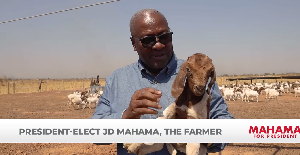...poultry due to low local production
Accra, April 13, GNA - Government on Tuesday said the inability of local producers to meet the domestic consumption of key products such as rice and poultry was making it difficult to place a ban on their importation.
Mr Kwaku Agyeman-Manu, the Deputy Minister of Finance said although domestic industries had the capacity to produce to meet market demand, they were unable to do so because of poor infrastructure and inadequate technological advancement necessary to create the required growth.
Other factors were lack of access to cheap credit and poor managerial acumen of most directors of these industries. He was speaking at a Media Dialogue, organized by the Friedrich Ebert Foundation and the Ghana Journalists Association on the topic: "Challenges of Ghana's Local Industries- Any Prospects for Fair Solutions"?
Mr Agyeman-Manu ruled out the used of high tariffs to ensure growth of local industries, saying that, experience in most developing countries in the past showed that, such protection mechanisms did not engender the growth envisaged for the sector.
Rather, he said, to encourage Ghanaian companies to be competitive, government was putting in place various mechanisms to ensure their future prospects.
These included various legislative, administrative and budgetary actions not only to protect Ghanaian products from imports but also assist the export of Ghanaian products to other countries, especially those in the West Africa sub-region.
In this connection, Mr Agyeman-Manu said the ministries of Private Sector Development and Trade and Industry would facilitate the access of Ghanaian products to both the local and international markets. Besides, the Customs Excise and Preventive Service and other security agencies are improving efforts to stem smuggling of goods into the country.
Mr Agyeman-Manu said in addition to these efforts, government and some development partners had sourced credit from various sources, which the domestic industries could tap into to expand.
With regard to poultry production, Mr Agyeman-Manu said the Ministry of Food and Agriculture and the Agricultural Development Bank had established a Broiler Project with the view to increase poultry production by 1.2 million birds by the end of this year.
A Poultry Board will soon be established to oversee the implementation of the poultry programme, which also would include the cropping and processing into oil and cake 10,000 hectares of soyabean and sunflower as feed for the birds to reduce feeding cost and improve the competitiveness of the poultry sector.
Mr Agyeman-Manu said similar initiatives were being carried out to boost rice production to at least, by 20 per cent.
Click to view details



Business News of Wednesday, 13 April 2005
Source: GNA
















